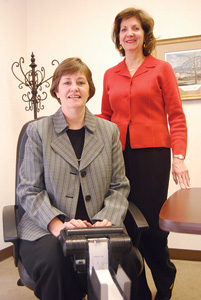Editorial
Front Page - Friday, January 22, 2010
Hall & Associates court reporters reveal the mysteries of their profession
David Laprad

While grilling a witness, a television lawyer will sometimes stop and ask the court reporter to read back something someone said. In ritualistic fashion, the stenographer will pick up the paper that’s rolled out of her machine and repeat the statement verbatim. Although the drama is fiction, the ability of the court reporter to capture over 200 words per minute at 98.5 percent accuracy is real.
That’s right: more than 200 words per minute, almost verbatim. No, court stenographers do not have extra fingers; like any other professional, they’re just good at what they do.
“You have to go to school,” says Terri Partain, a certified court reporter and co-owner of Chattanooga-based Hall & Associates. “It takes about two years. Your speed classes come last. When I was in school, you had to do 225 words per minute to graduate.”
The human mouth has no problem pumping out that many words per minute, but how can the human hand keep up? The secret is that the keys of the court reporting machine represent sounds rather than letters, so court stenographers must separate themselves from the way words are spelled and think phonetically.
“It’s not like typing on a typewriter,” Partain says, pulling her portable court reporting machine up to where she’s sitting. There are no markings on its 22 keys. “For example, you have FPLT, which together is a period. We also have an H and an R. Those are letters by themselves; combined, they form an L.”
Then there are brief forms of common statements such as “ladies and gentlemen of the jury” and “as a matter of fact,” which translate to LAIRJ and SMAFT, respectively.
The result is fewer keystrokes per word. For instance, “court reporting” requires 15 strokes on a regular keyboard, including the space, and only three on a court reporting machine.
As Partain demonstrates what she does, her keystrokes are recorded on paper as well as a 3.5-inch computer disk. Inside the machine, a personal dictionary unique to Partain translates the keystrokes and displays the results on a small screen. “When you get out of school, they give you a dictionary, which you write into your machine, word by word,” Partain says. “Then you send it off and they send you back a dictionary you can load into your computer so it will translate what you put in there.”
When Partain hits “chatchat,” for example, up pops Chattanooga.
Court reporting does have its challenges, as when three or four people are talking at once. When this happens, the court stenographer can raise her hand, and the judge will tell everyone to speak one at a time. Other times, the participants in a deposition, trial or meeting might use a complex and unfamiliar word. When this happens to Partain, she keys in the sounds, as she’s learned to do, and then gets the correct spelling from her client later on. Hall & Associates will also record proceedings for later reference, which can come in handy when someone has a difficult accent.
Partain’s job is not done once the judge dismisses the court. Rather, she must plug what she’s saved on disk into the translation program on her computer, edit the text, print a rough draft, proof read it, make any necessary corrections and then print the final copy. It might sound easy, but at 40 pages per hour of court time, a single document can be hundreds of pages long.
“It’s hard work,” Partain says, “and stressful, especially when you have a lot of deadlines. You might take an all day deposition, and they’ll need the final copy the following day, so you’ll have to stay up all night so you can give it to them in the morning. It takes discipline.”
Court reporting might not be easy work, but it is important. If a lawyer has a transcription of a deposition on hand, for example, he can remind a witness who’s trying to change his story during a trial what he said at the previous proceeding. Transcriptions are an important part of appellate proceedings as well when one party is trying to prove another party erred in a lower court.
Partain, her three partners and their corps of court reporters never get to see how their work is used, though; they simply do their job and deliver the final product to their client. Susan Martin, one of Partain’s partners, says they also enjoy their work.
“It might not sound like fun, but it is,” she says. “You get to go somewhere new every day and meet interesting people. It’s never boring. If you do get on something that’s not interesting, you’ll be on to something different the next day.”
To find out more about
Hall & Associates, visit www.hallreporting.com or call 423-267-4328.
|
|